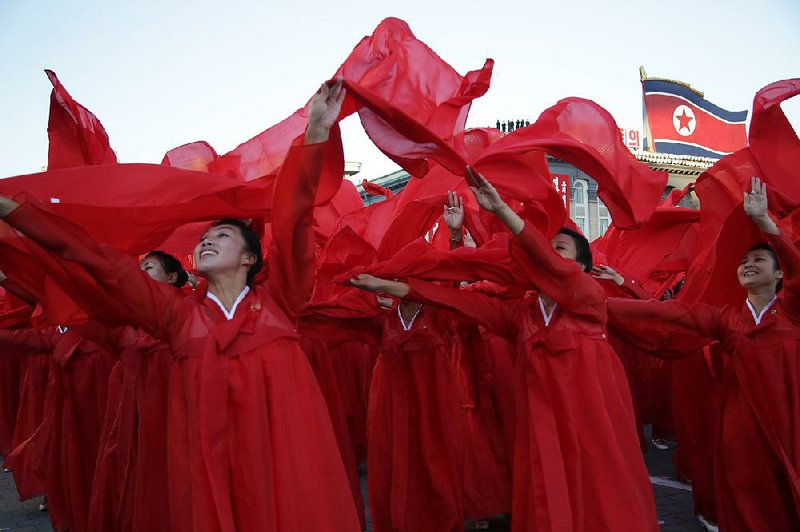PYONGYANG, North Korea -- North Korean leader Kim Jong Un took center stage at a military parade and rally in Pyongyang on Saturday to mark the 70th anniversary of the country's ruling party, declaring that the North has no intention of straying from the socialist track established by his grandfather and is ready to stand up to any threat by the United States.
Kim delivered the speech from the balcony of the Grand People's Study House as tens of thousands of his countrymen and an international media contingent watched from their places below on the capital's Kim Il Sung Square.
To punctuate his speech, thousands of goose-stepping troops as well as tanks, armored vehicles, rocket launchers and a variety of missiles mounted on trucks then rolled through the square. Military aircraft flew in formation, forming the symbol of the Workers' Party of Korea -- a hammer, brush and sickle. Another group of planes formed the number 70 in the sky.
Kim, who is in his early 30s, walked down a red carpet and saluted his honor guard before taking the podium to deliver a fiery speech.
"Our revolutionary force is ready to respond to any kind of war the American imperialists want," he said, flanked by visiting Chinese official Liu Yunshan and senior North Korean officials. He said North Korea's policy of putting its military first has made it "an impenetrable fortress and a global military power."
Brightly colored floats and thousands of civilian marchers waving red and pink bouquets of plastic flowers followed the military show. Others held up cards to spell out Kim's name.
As the parade ended, Kim waved to the crowd and raised clasped hands with Liu.
The afternoon rally, delayed by heavy rains the night before that required workers to mop up the square, was followed by a torchlight rally and fireworks display. The finale was a concert on a special stage set up on a river running through central Pyongyang. Tickets for foreigners hoping to attend the concert were going for $114.
It was the most elaborate spectacle North Korea has held since Kim assumed power after the death of his father, Kim Jong Il, in late 2011.
Though military parades fell out of fashion for about a decade starting in the 1990s, Saturday's was somewhat more elaborate than a similar anniversary event held two years ago, an indication that rolling tanks and missiles through the center of the capital is still seen by the North Korean government as a way of showing the world and the North Korean people that the Kim dynasty is firmly in control and its military is a power to be reckoned with.
But, reflecting North Korea's international isolation, no world leaders were present.
Liu, the No. 5 leader in the Chinese Communist party, was the senior foreign dignitary, though Cuba, Vietnam and other countries sent delegations. Kim has yet to make a state visit abroad -- his highest-profile visitor to date was former NBA star Dennis Rodman -- and he chose not to attend recent anniversary ceremonies held by his country's two closest allies, Russia and China.
China's official Xinhua News Agency said Liu told Kim that China was willing to work with North Korea for a quick resumption of six-party nuclear talks. The talks, which aim to end the North's nuclear program and also involve the U.S., South Korea, Russia and Japan, stalled seven years ago. Beijing has grown increasingly vocal about its discomfort with Pyongyang's nuclear ambitions.
North Korea has shown no interest in giving up its nuclear capability, which it considers the crown jewel of its national defense strategy.
At Saturday's event, Kim didn't specifically comment on North Korea's nuclear or long-range missile capabilities and also didn't have anything to say about relations with rival South Korea. He spent most of his speech touting the party's successes in improving the lives of the North Korean people in the face of external threats since the armistice that ended fighting in the 1950-53 Korean War.
North Korea maintains that its "military-first policy" is necessary to counter threats from South Korea and the United States, but officials have recently stressed the role of the party in improving the standard of living for the people, who are increasingly aware of how far they lag behind the more affluent South Korea and China.
In the run-up to this year's anniversary, large-scale construction and development projects have been launched and hailed with great fanfare in the state media.
Information for this article was contributed by Kim Tong-hyung of The Associated Press.
A Section on 10/11/2015


